November 16, 2022 - No. 46
People's Solidarity with Haiti, Yes! Canadian Interference, No!
Rally at Prime Minister
Justin Trudeau's Office
|
• 219th Anniversary of Historic Battle
of Vertières
November 18, 2022
People's Solidarity with Haiti, Yes! Canadian Interference, No!
Rally at Prime Minister Justin Trudeau's Office
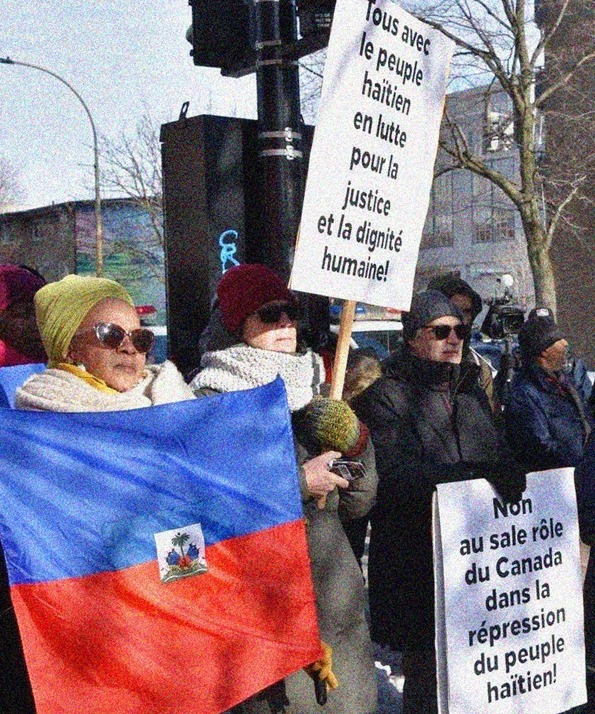 Join the rally outside Prime
Minister Justin Trudeau's Montreal office on November 18 to say
loud and clear: No to All
Foreign Occupation of Haiti!
Join the rally outside Prime
Minister Justin Trudeau's Montreal office on November 18 to say
loud and clear: No to All
Foreign Occupation of Haiti!
Now is the time for everyone to stand in solidarity with the people of Haiti, humanity's only people to have successfully led a revolt against slavery.
The rally is being organized on the anniversary of the last great battle for Haitian independence which took place in the city of Vertières on November 18, 1803, putting an end to the reign of the French slave owners and culminating in Haiti's January 1, 1804 declaration of independence. Since then, U.S. slave owners have not stopped looking for pretexts to re-institute new forms of slavery on the island.
In 2022, the Haitian diaspora, and the citizens of the world in struggle for peoples' sovereignty and social justice must espouse the Haitian cause in order to end neo-colonialism under the guise of humanitarian aid. In the interests of solidarity and real equality between peoples, let's do away with the white saviour complex.
Let us stand with the activists and vital forces in Haiti fighting for a break with the corrupt state, the departure of the corrupters from foreign embassies (Core Group) and an end to the impunity of criminal oligarchs in Haiti.
219th Anniversary of Historic Battle of Vertières November 18, 2022
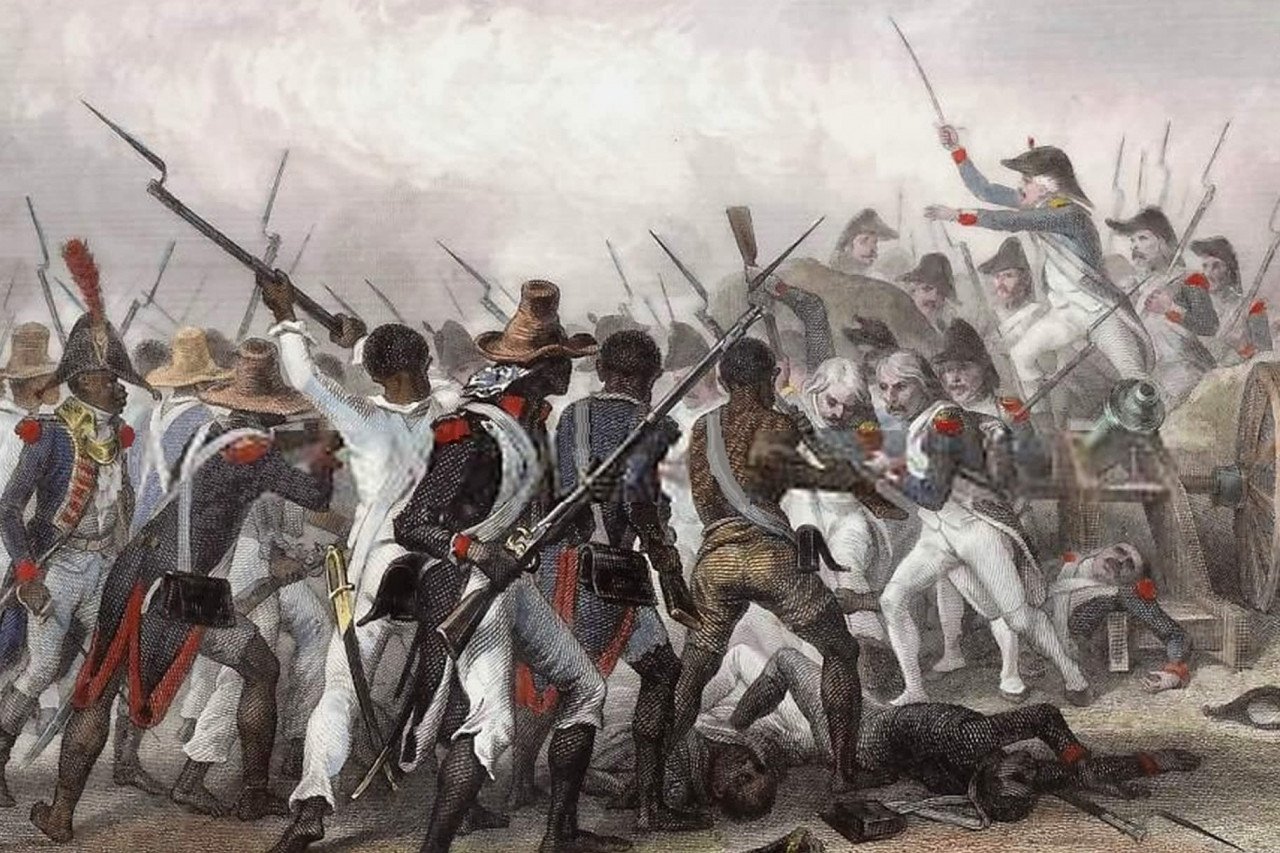
November 18, 2022 marks the 219th anniversary of the Battle of Vertières in Haiti. Located near the city of Cap-Haïtien in northern Haiti, Vertières is the site of a decisive battle in Haitian history. This battle led by Jean-Jacques Dessalines delivered the decisive blow to free the Haitian people from slavery and put an end to colonial rule by routing and defeating the Napoleonic army. It meant the elimination of slavery and led to the proclamation of Haitian independence and the formation of the Republic of Haiti on January 1, 1804.
|
Beginning in 1791, the enslaved people of the French colony of Santo Domingo rose up in an organized resistance to overthrow slavery and colonial rule. Led by Toussaint L'Ouverture and Jean-Jacques Dessalines, the Haitian people successively repelled the European powers of France, Spain and Britain.
The island was officially proclaimed independent from France on January 1, 1804 by the Act of Independence of the Republic of Haiti read by Dessalines in Gonaïves. Haiti then became the first Black Republic in the world.
This indomitable spirit of the Haitian revolutionaries and the Haitian people lives on in their descendants and compatriots, many of whom live and work in Quebec and Canada. The profound affirmation of the rights and sovereignty of the Haitian revolution continues to characterize the people's unwavering resistance to the interference of foreign powers. From 1804 to the present, the colonial and imperial powers have not ceased to take revenge on the Haitian people who continue to struggle for peace, freedom and democracy without respite.
Today, this battle is not over. Haiti has been dealt many harsh blows in recent times -- the 2004 military coup against Haiti's democratically elected president, Jean-Bertrand Aristide, by foreign powers including Canada, the United States and France; the subsequent electoral coups backed by those same powers; the theft of Petrocaribe funds; the assassination of President Jovenel Moïse in the summer of 2021; the shameless corruption in the country with the connivance of corrupt politicians and foreign actors who finance mercenaries to create and maintain chaos; the earthquakes, tropical storms, cholera and so many other tribulations. Despite all this the Haitian people are resisting and fighting to put an end to the foreign takeover of the country and the fomenting of activities to keep it in a state of misery and servitude.
Haiti must obtain justice. Canada must get out of Haiti, out of the Core Group, cease its activities as a servile conqueror on behalf of the United States, provide reparation for its criminal role in Haiti and cease its diplomatic, military and police interference in Haitian affairs.
Full support for the Haitian people's struggle for their right to decide their own destiny, without foreign interference of any kind!
No to All Foreign Interventions in Haiti!
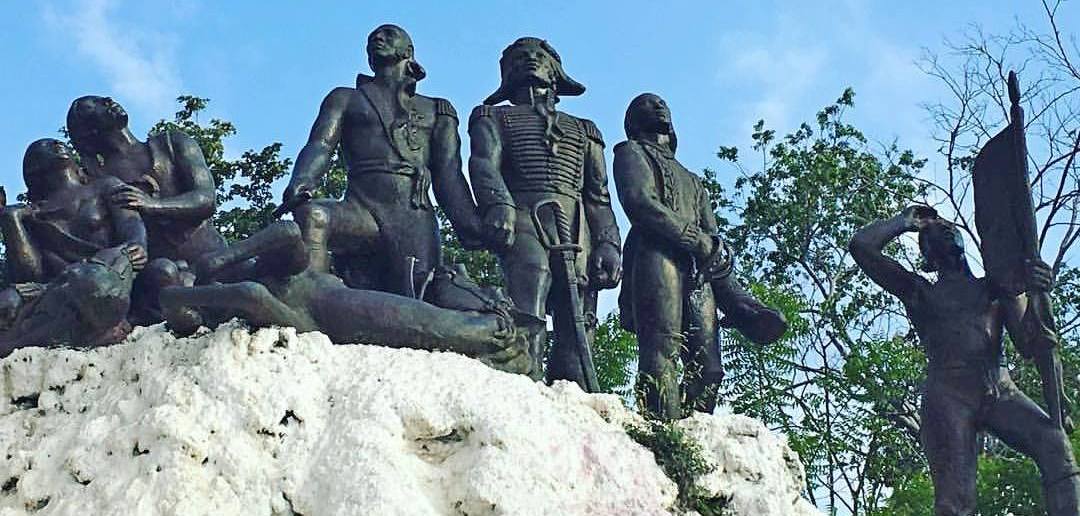
A monument to the victors at the Battle of Vertières was erected
on the site of the battle in 1953 on the occasion of the
150th anniversary.
The Situation in Haiti
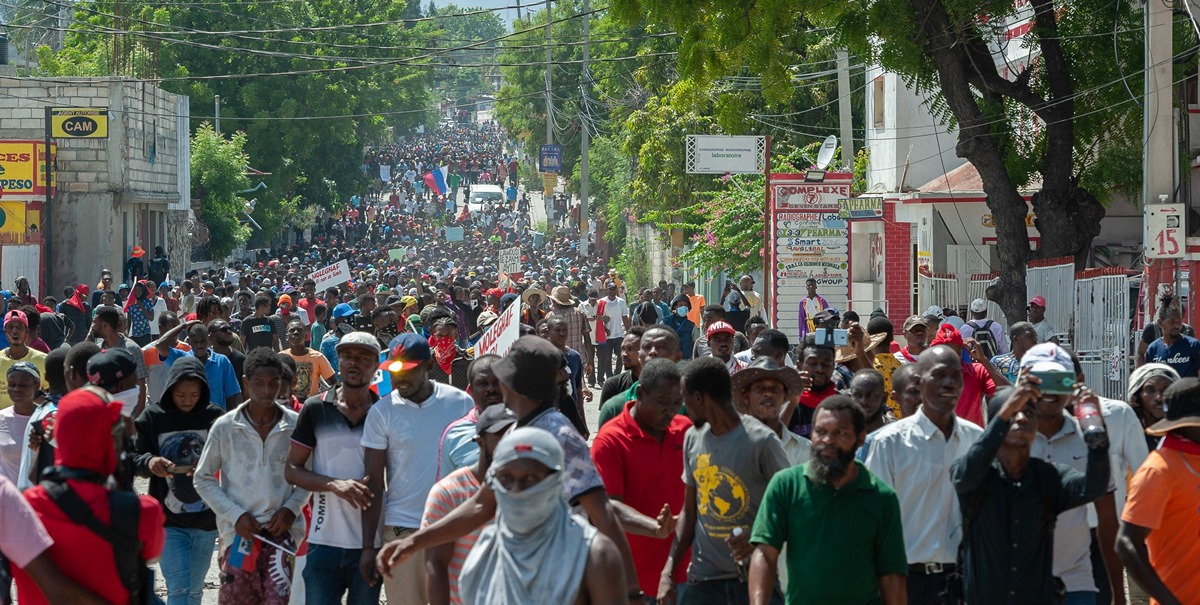
Demonstration in Haiti October 18, 2022, against further
foreign intervention.
The Marxist-Leninist: Media are reporting that intervention in Haiti would be justified because the big powers would like to bring goods and food, what they call "humanitarian aid" to Haiti, but that would be impossible to do because of the gangs. So they want to intervene to save the Haitian people. Can you tell us about that?
Jennie-Laure Sully: Yes, this is the media discourse, the dominant discourse. That's what's being put forward for the Canadian public -- saying that there is a humanitarian crisis caused by criminal gangs in Haiti. Of course there is no historical context provided and there are many facts that are not revealed.
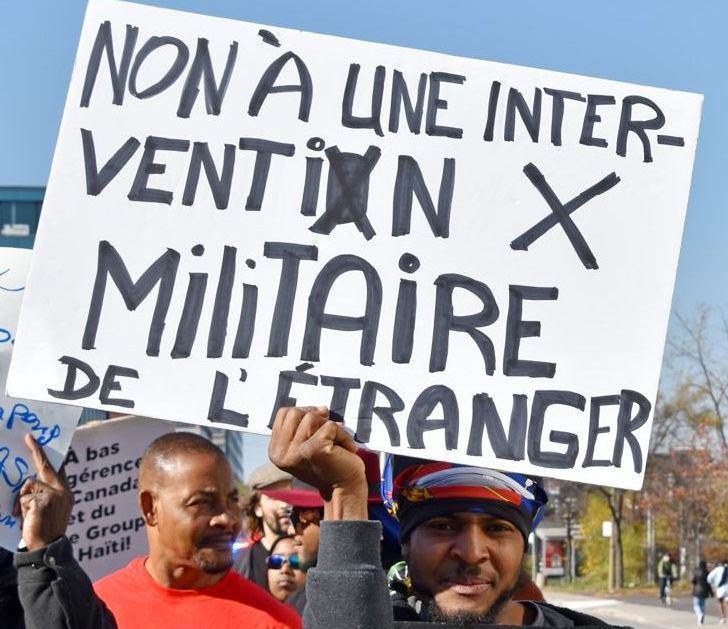 First of all, when they talk
about criminal gangs, what they don't say is that in Haiti,
there is no manufacturing of weapons or ammunition. So when they
talk about gangs that have weapons and are able to block goods,
to block access to fuel, we must ask ourselves the question:
where do the weapons that are in the hands of these criminals
come from? If the weapons are not made in Haiti, where do they
come from? There has been research on this and Haitian
journalists have spoken out. They say that these are weapons
that come from the United States. These weapons arrive in the
country with the consent of rich families, oligarchs, who
circulate and distribute these weapons.
First of all, when they talk
about criminal gangs, what they don't say is that in Haiti,
there is no manufacturing of weapons or ammunition. So when they
talk about gangs that have weapons and are able to block goods,
to block access to fuel, we must ask ourselves the question:
where do the weapons that are in the hands of these criminals
come from? If the weapons are not made in Haiti, where do they
come from? There has been research on this and Haitian
journalists have spoken out. They say that these are weapons
that come from the United States. These weapons arrive in the
country with the consent of rich families, oligarchs, who
circulate and distribute these weapons.
We know that within the Haitian police force, there are policemen who have left the police force and joined what are called "gangs." But the real word that should be used is "mercenary." These are mercenaries who are in the pay of the local oligarchs in Haiti. This is a way for the oligarchs to prevent demonstrations, popular demands; they want to terrorize the demonstrators for years and make sure that there are divisions within the people. In the poor districts, they want to create rival factions, a kind of chaos, and then these same oligarchs will ally themselves with the illegitimate government and foreign embassies and then declare, "it is chaos, we need military intervention."
The situation in Haiti has been rotting for a very long time under the eyes of the police, the de facto government and these families. And now, after having allowed mercenaries to sow chaos, they are asking for foreign help to solve a problem that they could have solved at the source by preventing the circulation of weapons. This is bad faith, these are lies that are being spread. And the Western and Canadian media are participating in these lies because Canada is part of the Core Group. The Core Group is a group of foreign ambassadors who, at least since 2004, have been interfering in Haiti's affairs to defend their own economic interests.
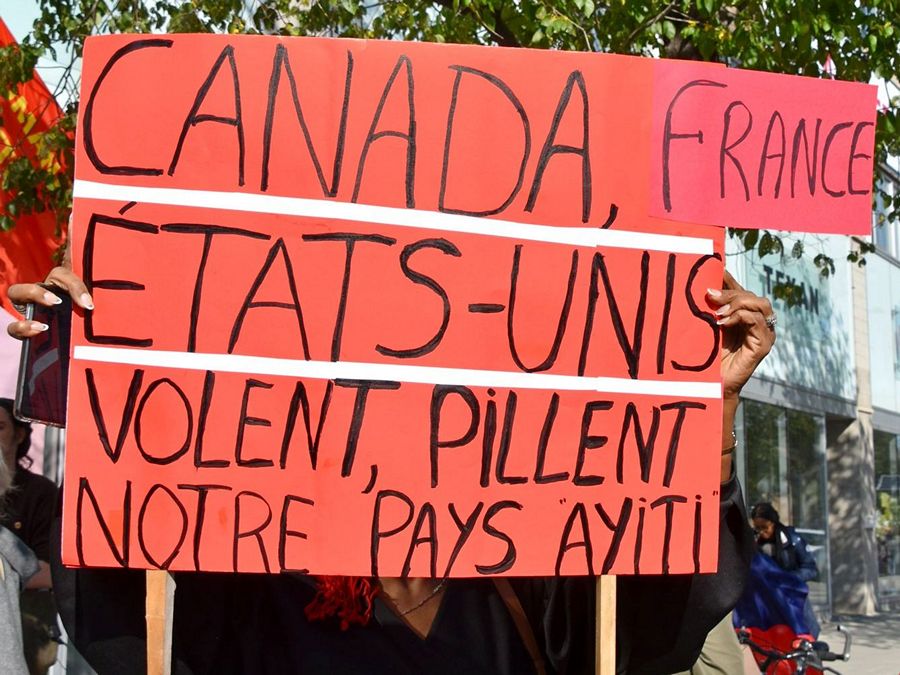 In the case of Canada, the
economic interests defended are those of the Canadian mining
companies in Haiti who want to collude with the corrupt in power
in order to do what they want with the Haitian subsoil. They
want exploitation permits without being hindered. They do not
want to be asked for royalties on the eventual extraction of
mineral resources. So it is to their advantage to have a
government that defends their interests rather than the
interests of the people. So Canada participates in the Core
Group to defend its economic interests and pretends to be
interested in the Haitian people, in the women and children who
have been raped, etc. But they have never taken any action to
protect the people. They have never made any decisions in favour
of women and children.
In the case of Canada, the
economic interests defended are those of the Canadian mining
companies in Haiti who want to collude with the corrupt in power
in order to do what they want with the Haitian subsoil. They
want exploitation permits without being hindered. They do not
want to be asked for royalties on the eventual extraction of
mineral resources. So it is to their advantage to have a
government that defends their interests rather than the
interests of the people. So Canada participates in the Core
Group to defend its economic interests and pretends to be
interested in the Haitian people, in the women and children who
have been raped, etc. But they have never taken any action to
protect the people. They have never made any decisions in favour
of women and children.
NGOs for example in Haiti are part of the problem, not the solution. What they do is weaken the state. When donations are sent, they are often used to pay for the development workers' hotels, jeeps, security guards, insurance, and the money eventually comes back to Canada. And the state is weakened because the NGOs that claim to be trying to meet the social needs of the population are not accountable to the Haitian population. They are accountable to their donors in Canada or elsewhere. It is an anti-people, anti-democratic system and this pretext of humanitarianism does the business of Canadian companies, it gives good conscience to some people who say we will make donations and it will help.
When we talk about oligarchs, there are families that have controlled the Haitian economy for centuries. There are some who are more recent, dating back to the first American occupation from 1915 to 1934. When they occupied during this period, these conquerors got rid of the old elite who were descendants of European slavers. The new elite that replaced them were people who came from the Middle East -- Syria, among other places, and the Americans preferred to do business with them rather than with the old elite. Some of them have mixed with the old slave-owning elite, but the fact remains that these families are known. They are never named in the media, but we can name the Bigio, Acra, Brandt, Mevs families. These are the families who control the ports in Haiti, for example. So they know what goods are coming in and going out. There is even a port that belongs to only one of these families and that is a private port, privatized.
These families own land, infrastructure, and are in the import-export business. They are what we call compradors in the sense that they often have another nationality, American among others. Many of them travel between Haiti and Miami or Europe and do business, without ever developing the country. This is what we see. To ensure their own security, they will call in mercenaries and increasingly make sure that they have a government that protects them and the foreign interests to which they are linked and want to ensure that popular demands are suppressed in different ways: foreign interventions, mercenaries, gangs on their payroll. There are all kinds of ways to repress the Haitian people.
TML: Can you tell us about the links between the Canadian police and these Haitian mercenaries? Among other things, in the UN resolution adopted on October 18 establishing a sanctions regime for Haiti, Jimmy Cherizier (aka Barbecue) is listed as enemy number 1 (and he is the only enemy mentioned in the resolution), what do you think?
JLS: Barbecue is the nickname of Jimmy Cherizier, a former police officer, from one of those cohorts trained by the Canadian police. It is in this sense that there are questions to be asked because the Haitian national police, the PNH, was trained by Canadians. There have been several cooperation agreements between Haiti and Canada for police training. We hear that there are many people from the famous gangs who come from this police force, who have all been trained in one way or another by the Canadian police, who have received technical assistance, equipment; there is a lot of Canadian money in this Haitian police force. This has been done on a recurring basis since at least 2010 if not before. When there was the coup against Jean-Bertrand Aristide, after the Ottawa Initiative for Haiti in 2003, Canada committed itself in three areas: justice, prisons and police. Since 2003, this is the roadmap that Canada has followed. And even when they say today that they are going to invest in feminist policies, it is to bring more women into the police force.
Regarding Jimmy Cherizier, after leaving the police force, if we search in Haitian media sources from 2020, we start hearing about him as a gang leader. And who does he prey on? He's going after people in the slums. And that's where I talk about this tactic of wreaking havoc in the poorest neighbourhoods, the very neighbourhoods that are trying to organize against the fact that they don't have a minimum wage when they work, the fact that people can't find work, and have all sorts of social and economic demands. We are talking about neighbourhoods like Bel-Air, Cité-Soleil, La Saline. And in these neighbourhoods there are many people who still identify with the Lavalas party of Jean-Bertrand Aristide, and we know that there are attempts at popular organizations, or other socialist-type parties. These neighbourhoods are constantly targeted by the oligarchs and the de facto governments because they see that these neighbourhoods are a source of revolt. Maybe the UN talks about him to give him credit in front of the people? We must ask ourselves this question.
From the point of view of Solidarité Québec-Haïti, the information that we have gathered reveals that there is nothing that allows us to say that he is not guilty of a crime. He presents himself as a revolutionary. This seems to us to be a pitch that he is making to try to save his skin. We don't know if the people who had armed him no longer trust him for all sorts of reasons.
TML: Thank you very much Jennie-Laure
for this valuable information so we can form our own opinion in
the tide of disinformation justifying foreign intervention in
Haiti.
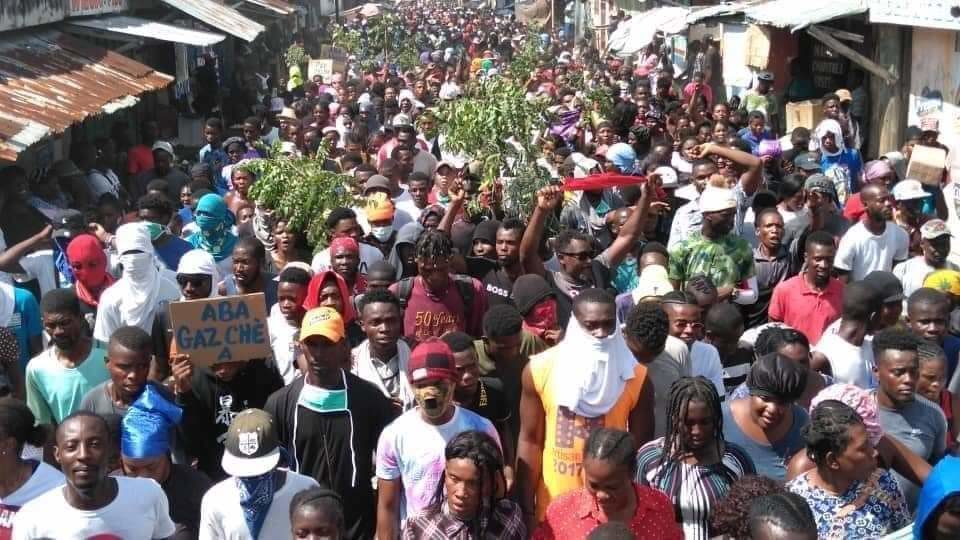 Haiti, October 10, 2022
Haiti, October 10, 2022
(To access articles individually click on the black headline.)
Website: www.cpcml.ca Email: editor@cpcml.ca

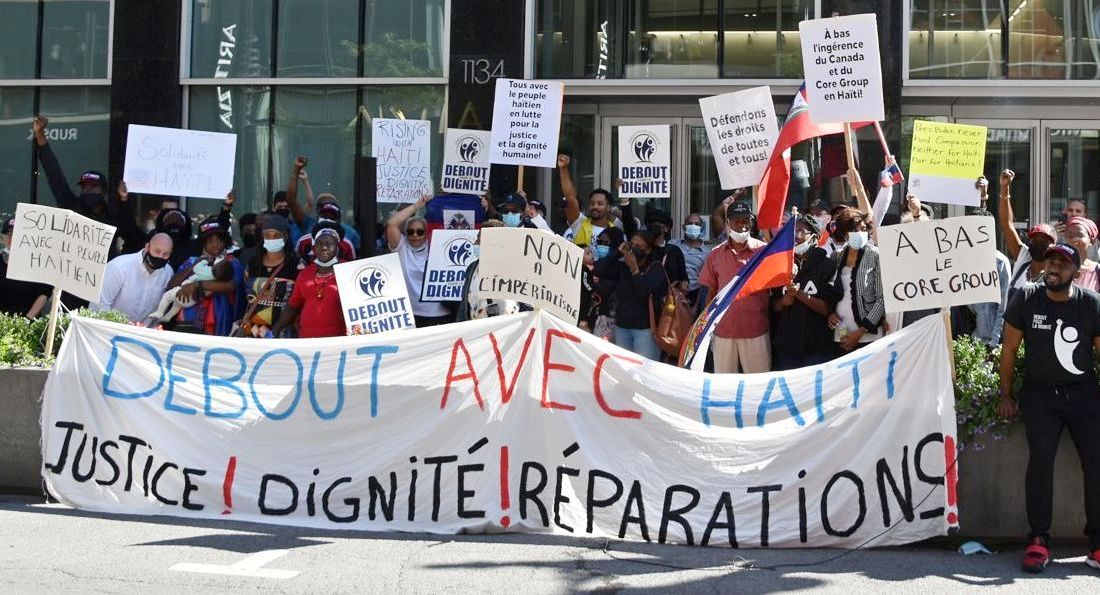

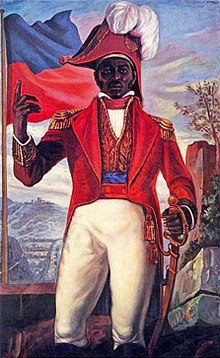 Jean-Jacques Dessalines
Jean-Jacques Dessalines